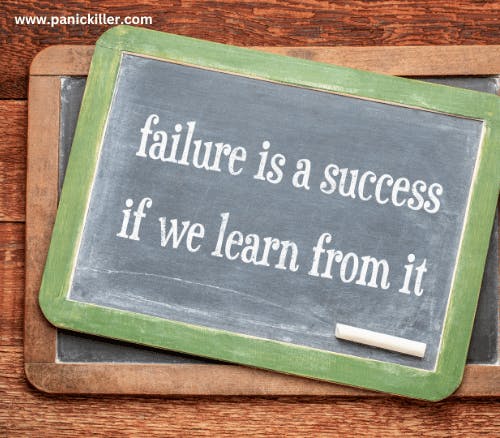
How to accept failure and learn why fear of failure lead to anxiety
Jan 4, 2024
Introduction
Fear of failure is a common human emotion that can have a significant impact on one's mental well-being. When the fear of failure becomes overwhelming and uncontrollable, it can lead to anxiety.
In this article, we will explore the connection between fear of failure and anxiety, understand how this fear manifests in different aspects of life, learn how to accept failure and discuss strategies to overcome it.

Understanding Fear of Failure
Fear of failure is the apprehension or anxiety that arises from the possibility of not succeeding in a particular endeavor. It is a natural response to the uncertainty and risks associated with trying something new or challenging. While a certain level of fear can be motivating and help us perform better, an excessive fear of failure can be debilitating and hinder personal growth.
The Link Between Fear of Failure and Anxiety
When the fear of failure becomes overwhelming, it can spiral into anxiety. Anxiety is a persistent feeling of unease, worry, or fear that can manifest physically, emotionally, and cognitively. The fear of failure triggers a cascade of negative thoughts and beliefs, leading to heightened anxiety levels. This anxiety can then have a profound impact on various aspects of life, including work, relationships, and personal development.

Impact on Work
Fear of failure can significantly impact one's professional life. It can lead to avoidance of challenging tasks, procrastination, and self-doubt. When individuals are constantly worried about making mistakes or not meeting expectations, it can hinder their ability to take risks, innovate, and grow in their careers. This fear can also lead to a lack of confidence, which may prevent individuals from pursuing new opportunities or expressing their ideas.
Impact on Relationships
The fear of failure can also affect personal relationships. It can create a fear of rejection or judgment, leading individuals to avoid social situations or hold back from forming meaningful connections. This fear can manifest as a fear of public speaking, social anxiety, or a constant need for validation. Over time, the fear of failure can strain relationships and hinder one's ability to develop deep and fulfilling connections with others.
Impact on Personal Development
Fear of failure can be a significant barrier to personal growth and development. It can prevent individuals from stepping out of their comfort zones, trying new things, or pursuing their passions. The fear of failure often leads to a fear of making mistakes, which can hinder learning and hinder the acquisition of new skills. This fear can limit personal achievements and prevent individuals from reaching their full potential.
Tips to overcome Fear of Failure and Anxiety
1. Recognize and acknowledge the fear
The first step is to acknowledge and accept the fear of failure. Recognize that everyone experiences this fear to some degree, and it is a normal part of the human experience.
2. Challenge negative thoughts and beliefs
Identify the negative thoughts and beliefs that contribute to the fear of failure. Challenge them by examining the evidence and considering alternative perspectives. Practice positive self-talk and affirmations to counteract negative thinking patterns.
3. Set realistic goals and expectations
Break down big goals into smaller, achievable tasks. Set realistic expectations for yourself and understand that setbacks and mistakes are part of the learning process. Embrace a growth mindset that values progress over perfection.
4. Celebrate small victories
Acknowledge and celebrate your accomplishments, no matter how small they may seem. Each step forward is a success and a valuable learning experience. This positive reinforcement can help build confidence and reduce anxiety.
5. Seek support and guidance
Reach out to friends, family, or a professional counselor for support. Sharing your fears and anxieties with others can provide perspective, encouragement, and helpful advice. Consider joining support groups or seeking professional therapy if anxiety persists.

6. Practice self-care and stress management
Take care of your physical and mental well-being. Engage in activities that promote relaxation, such as exercise, meditation, or hobbies. Ensure you get enough sleep, eat a balanced diet, and maintain a healthy work-life balance.
7. Embrace failure as a learning opportunity
Shift your perspective on failure. See it as an opportunity for growth, learning, and self-improvement. Embrace the lessons learned from failure and use them as stepping stones toward success.

What failure means at the end?
The fear of failure can lead to anxiety and have a profound impact on various aspects of life.
Recognizing and addressing this fear is essential for personal growth and well-being. By challenging negative thoughts, setting realistic goals, seeking support, and embracing failure as a learning opportunity, individuals can overcome their fear of failure and reduce anxiety. Remember, it is through facing our fears that we discover our true potential and achieve personal and professional success.




